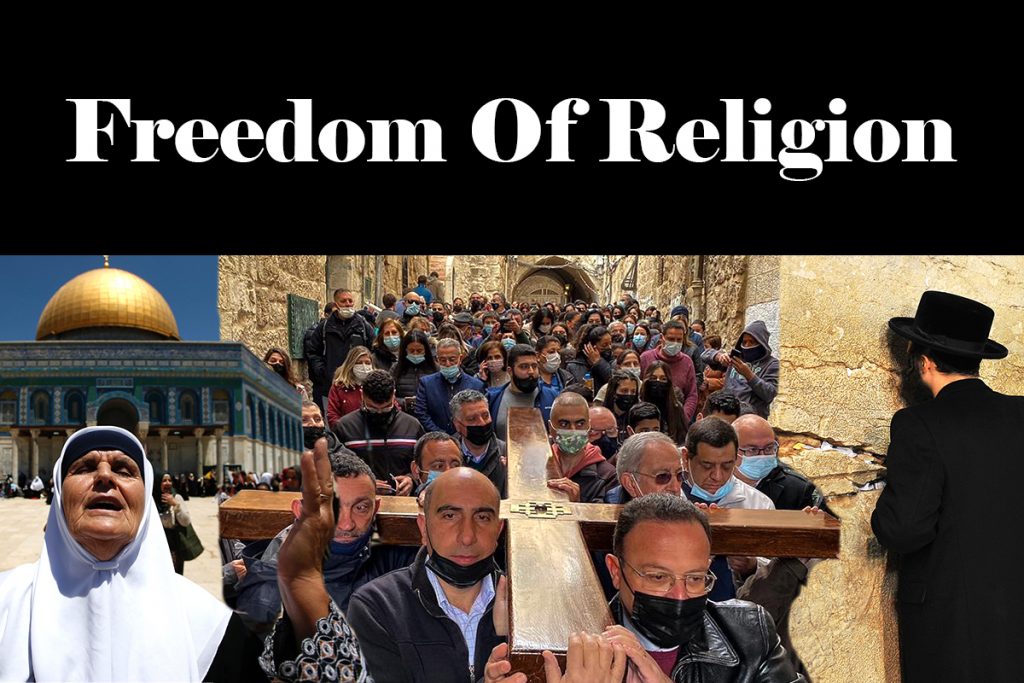
As attacks on Palestinian Christians and Muslims are increasing in Palestine/Israel, Sabeel continues to work with other organizations and the community to protect the freedom of religion for Palestinians of all faiths.
In response to pressure from Church leaders, on 29 April, a bipartisan group of eight Members (Republican and Democrat) of the U.S. Congress sent a letter in solidarity with the Palestinian people to Secretary of State Antony Blinken about protecting the freedom of religion for people of all religions in Palestine/Israel. The members of Congress expressed deep concerns about the increase in attacks against churches and the Christian community in Jerusalem. They expressed concerns about the humanitarian and economic consequences of the decline in the Christian presence in Jerusalem as a result of the violence. The letter notes that many programs led by Christian churches address the medical, educational, and humanitarian needs of people of all religions in Palestine/Israel and Jordan. It also states that Christian tourism to historic Palestine brings $3 billion to the economy.
Over thirty organizations sent a letter to the bipartisan group of eight Members of the U.S. Congress to thank them for the letter and express their organizations’ deep concern about the situation.
On Thursday 21 April, Sabeel along with a group of organizations and community leaders filed a complaint against the Israeli police in the High Court of Justice, the supreme court of Israel. The police had notified the leaders of the Church of the Holy Sepulchre that they would allow only 1000 people inside the Church for the annual Holy Fire service which occurred this year on 23 April. This is more than 90% lower than the number allowed to enter in previous years: 11000. The Church leaders rejected this new limit and said that they would not honor it, because it is a violation of the freedom of worship.
The High Court asked the community to reach a deal with the police. But no agreement was reached. The Court made the decision that no restrictions should be imposed in the Christian Quarter because there is no reason for any restrictions. The Court decided they would allow 4000 people inside and around the Church on the day of the festivities and imposed extra measures. On the day of the Holy Fire service, many people were not allowed to access the Church. Some feel that the police were more violent with the community because of the High Court decision. Even diplomats and community members were not respected and were badly treated by the police.
Sabeel has worked on a petition to support the Church leaders in standing against the Israeli government’s restrictions. Close to 4000 people have signed the petition and shared it with decision makers in their own countries. In 2010 and 2014, the community also appealed to the High Court to end restrictions on the rights of Palestinian Christians to attend services at the Church and to protect the freedom of worship. But the Court refused to take a position and said the police should respect the right to freedom of worship. The Israeli police have continued to create more restrictions.
According to the tradition of the Church, each year on the day before Orthodox Easter, a flame miraculously appears inside the empty tomb of Jesus in the Church of the Holy Sepulchre. The flame is captured by the Greek Patriarch of Jerusalem and is shared with thousands of Palestinian Christians and pilgrims who cheer as the church bells ring and hold candles. The Fire is quickly passed from candle to candle. As it has for centuries, the Holy Fire is brought to the different corners of the world. Lanterns holding the flame are put into cars and driven to Gaza, Ramallah, Bethlehem, and the border crossings with Egypt and Jordan.”
In addition, there have been an increase in attacks on Muslim Palestinians and Muslim cemeteries as well as restrictions on access to the Al-Aqsa Mosque and other mosques. The Israeli military have increased their attacks on Muslim worshippers at Al-Aqsa, especially during Ramadan and Passover this year. The Israeli military regularly arrests Palestinians trying to worship and injures them with rubber bullets and tear gas. Meanwhile, Israeli settler groups who want to build a third Jewish temple where Al-Aqsa sits (on the Haram Al-Sharif / Temple Mount) continue to visit the holy site, harass worshippers, and try to hold religious activities there.
